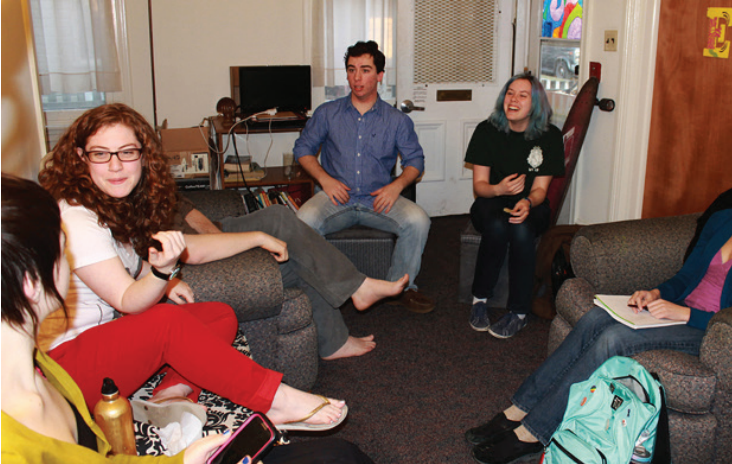Senate Grants SPANKK Dissolution Request
Student Senate announced the dissolution of the club SPANKK (Students Promoting an Active Network of Kinky Knowledge) last week during their April 1 meeting. The decision to dissolve the club came after its leadership received recommendations from members of the college administration.
The club, which gained Student Senate recognition on February 2013, was designed as an open forum for students and faculty to discuss sexual practices and lifestyles.
The club’s decision to dissolve came after the school ran into issues with the college’s insurance company.
According to Basner, SPANKK was told to dissolve the club by Dean Bylander and the college’s General Counsel Dana Scanduto, who explained that the college’s insurance company would not insure the group because of a potential liability.
“The insurance company would not cover SPANKK because we presented a potential liabilities to the school,” explained Basner.
Dana Scaduto, college legal counsel, said that she contacted the college’s insurance carrier after Senate approved SPANKK.
“The carrier responded that the club and its activities [were] not a risk it was willing to insure,” Scaduto said. “In fact, the carrier issued a policy endorsement excluding SPANKK from its protection. Consequently, as counsel to the college, it was my recommendation that recognition of the club be withdrawn. To allow the club to exist without the protection available through insurance would not have been a responsible action by the institution.”
Student Senate President William Nelligan ’14 worked with SPANKK during the fall semester after the issue of insurance came up. Nelligan considered such charges unfounded, since the discussion-based group did not engage in sexual activities during meetings and said he sought but did not receive clarification about the liability concerns.
“SPANKK’s faculty advisor, Megan Yost, and I both sent detailed follow-up questions in the hopes of continuing the conversation about the club,” said Nelligan. “Unfortunately, we were rebuffed.”
According to Bylander, she explained the insurance company’s exclusion policy with Basner, Yost and Nelligan following a meeting about SPANKK during the 2013 Fall semester, and also told them that she “was interested in further dialogue.”
“One of the faculty members at the meeting talked about ways to discuss healthy sexuality along the spectrum and I was interested in exploring those dialogues,” Bylander said. “I am clear that not having a recognized student organization does not change individual’s practice of BDSM. These practices certainly existed before SPANKK came into being and I assume they continue. This is really a question of whether they are ‘officially sanctioned’ by the college [and] can receive funding for programming.”
However, Basner said that the group was never grounded in the practice of BDSM, but rather sought to educate students about safety in alternative sexual practices.
“My understanding from the conversations I had with members of the faculty and administration is that the fear was that students might attempt to do something…based on advice they heard at a SPANKK meeting, get hurt, and thus put the school in a sensitive position,” said Basner. “[But] SPANKK wasn’t a group that did anything beyond discussion — we were education and discussion based. I viewed it as the kinky version of the sex-ed provided on this campus; giving away condoms and educating students about how to have safe and consensual sex doesn’t lead to more accidents, does it? Accidents are going to happen anyway, and my efforts were entirely to help reduce those accidents, not contribute to them.”
According to Austin Davis ’15, senate Vice President for Club Affairs, club dissolution is relatively rare. A club may ask to be dissolved if it does not have enough members to function, or if its leadership responsibilities become too demanding for its officers. Davis said that the last club that requested to be dissolved was the Model United Nations during the 2010-2011 academic year.






